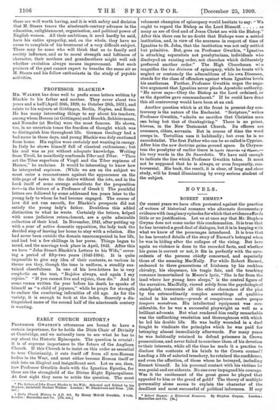EARLY CHURCH HISTORY4 PROFESSOR GWATKIN'S utterances are bound to have
a certain importance, for he holds the Dixie Chair of Divinity at Cambridge, and we naturally turn to see what he has to say about the Historic Episcopate. The question is crucial : it is of supreme importance to the future of the Anglican Church. If this Church is to insist on this order as essential to true Christianity, it cuts itself off from all non-Roman bodies in the West, and must either become Roman itself or sink into an illogical and insignificant sect. Let us see, then, how Professor Gwatkin deals with the Ignatian Epistles, for these are the stronghold of the Divine Right Episcopalians. At first sight they seem to settle the question. The most
• The Letters of John Stuart Blackie to his Wife. Selected and Edited by his Nephew, Archibald Stodert Walker. London: W. Blackwood and Sons. [12s. net.] t Early Church History to A.D. 313. By Henry Melvill Gwatkin. 2 vols. London : Macmillan and Co. [Vs. net.]
vehement champion of episcopacy would hesitate to say: " We
ought to regard the Bishop as the Lord Himself as many as are of God and of Jesus Christ are with the Bishop." After this there can be no doubt that Bishops were a settled institution, and, in view of the nearness in respect of time of Ignatius to St. John, that the institution was not only settled but primitive. But, goes on Professor Gwatkin, "Ignatius is attacking separatists not presbyterians, individuals who disobeyed an existing order; not churches which deliberately preferred another order." The High Churchman wi o magnifies the ius divinum of episcopacy, while he treats with neglect or contumely the admonitions of his own Diocesan, stands for the class of offenders against whom Ignatius levels his anathemas. Further, Professor Gwatkin urges the nega- tive argument that Ignatius never pleads Apostolic authority. "He never says—Obey the Bishop as the Lord ordained, or as the Apostles gave commandment." If he could have done this all controversy would have been at an end.
Another question which is at the front in present-day con- troversy is the nature of the Eucharist. " Scripture," writes Professor Gwatkin, " admits no sacrifice that Christian men oan bring but that of thanksgiving." There is no priest, hiereus, in the New Testament Church. Its officers are overseers, elders, servants. But in course of time the word creeps in. Tertullian uses it habitually; but even he is no sacerdotalist. The first Father who can be so called is Cyprian. After him the new doctrine gains ground apace. In Chrysos- tom the presbyter of earlier times is lepebs iibElfTan cep' 04=73,— his very words in the De Sacerdotio. We have said enough to indicate the line which Professor Gwatkin takes. It must not be supposed that he is always, or even frequently, con- troversial. His book, the result, it is clear, of long and close study, will be found illuminating by every serious student of the subject.


































 Previous page
Previous page